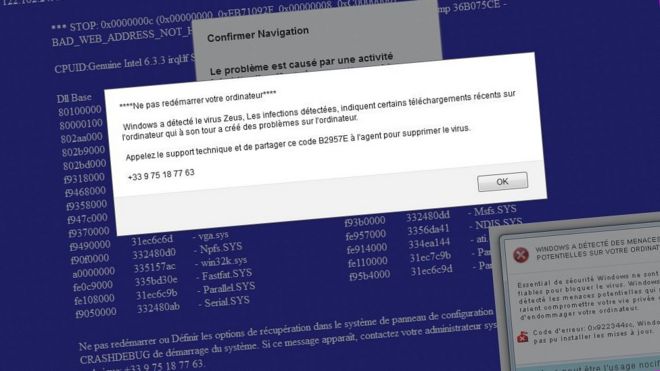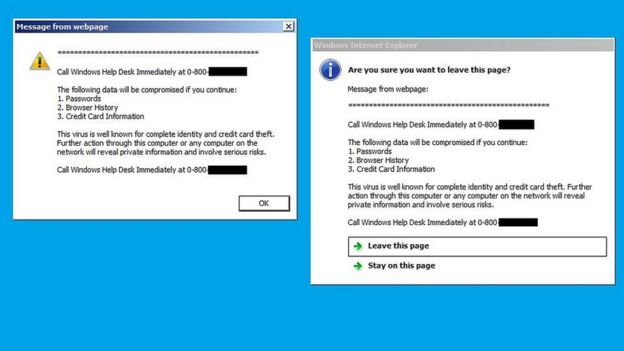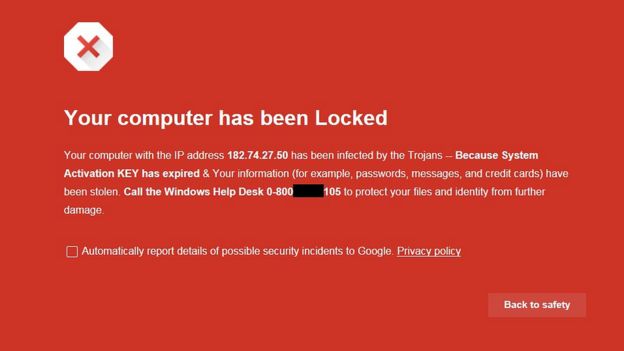- Aug 6, 2015
- 306
This is a brilliant read! I so want to try this!

The scareware message told Mr Kwiatkowski to call technical support
A French security researcher says he managed to turn the tables on a cyber-scammer by sending him malware.
Technical support scams try to convince people to buy expensive software to fix imaginary problems.
But Ivan Kwiatkowski played along with the scheme until he was asked to send credit card details. He instead sent an attachment containing ransomware.
He told the BBC he wanted to waste the man's time to make the scheme unprofitable.
Scareware

Scareware messages are designed to spook novice users
Technical support scams are designed to scare people into buying useless and sometimes harmful software.
Scammers send out emails, create fake websites or place advertisements online, falsely warning people that their computers have been infected with viruses.
They encourage victims to contact "technical support" via a supplied telephone number or email address.
"In most cases, the scammer's objective is to convince you that your machine is infected and sell you a snake-oil security product," Mr Kwiatkowski told the BBC.
Not fooled

This scareware advert looks like a genuine Google Chrome warning - but is fake
When Mr Kwiatkowski's parents stumbled across one such website, he decided to telephone the company and pretend he had been fooled.
The "assistant" on the telephone tried to bamboozle him with technical jargon and encouraged him to buy a "tech protection subscription" costing 300 euros (£260).
Mr Kwiatkowski told the assistant that he could not see his credit card details clearly and offered to send a photograph of the information.
But he instead sent a copy of Locky ransomware disguised as a compressed photograph, which the assistant said he had opened.
"He says nothing for a short while, and then... 'I tried opening your photo, nothing happens.' I do my best not to burst out laughing," Mr Kwiatkowski wrote in his blog.
Tips for avoiding scareware
"I respond to email scam attempts most of the time, but this was the first time I responded to one over the telephone," Mr Kwiatkowski told the BBC.
"I'm curious about how criminals operate and what they're trying to accomplish.
"More often than not it ends up being fun and there's social utility in wasting their time. I believe that if more people respond and waste their time, their activities might not be profitable enough to continue."

Technical support scammers try to baffle victims with technical jargon
Mr Kwiatkowski said he could not be absolutely certain whether the ransomware had infected the scammer's computer, but there was a fair chance it had.
"He did not let on that something had happened to his computer, so my attempt is best represented as an unconfirmed kill," said Mr Kwiatkowski.
"But encrypting a whole file system does take some time."
He acknowledged that some people may have found his retaliation unethical, but said responses had been "mostly positive".
"People respond well to the story because this is such a David versus the Goliath setting," he said.
However, Professor Alan Woodward from the University of Surrey warned that "hacking back" could have consequences,
"There's a lot of talk around hacking back - and while it may be very tempting, I think it should be avoided to stay on the right side of the law.
"But wasting their time on the phone I have no problem with. I even do that myself!"
Justice had sure been served!

The scareware message told Mr Kwiatkowski to call technical support
A French security researcher says he managed to turn the tables on a cyber-scammer by sending him malware.
Technical support scams try to convince people to buy expensive software to fix imaginary problems.
But Ivan Kwiatkowski played along with the scheme until he was asked to send credit card details. He instead sent an attachment containing ransomware.
He told the BBC he wanted to waste the man's time to make the scheme unprofitable.
Scareware

Scareware messages are designed to spook novice users
Technical support scams are designed to scare people into buying useless and sometimes harmful software.
Scammers send out emails, create fake websites or place advertisements online, falsely warning people that their computers have been infected with viruses.
They encourage victims to contact "technical support" via a supplied telephone number or email address.
"In most cases, the scammer's objective is to convince you that your machine is infected and sell you a snake-oil security product," Mr Kwiatkowski told the BBC.
Not fooled

This scareware advert looks like a genuine Google Chrome warning - but is fake
When Mr Kwiatkowski's parents stumbled across one such website, he decided to telephone the company and pretend he had been fooled.
The "assistant" on the telephone tried to bamboozle him with technical jargon and encouraged him to buy a "tech protection subscription" costing 300 euros (£260).
Mr Kwiatkowski told the assistant that he could not see his credit card details clearly and offered to send a photograph of the information.
But he instead sent a copy of Locky ransomware disguised as a compressed photograph, which the assistant said he had opened.
"He says nothing for a short while, and then... 'I tried opening your photo, nothing happens.' I do my best not to burst out laughing," Mr Kwiatkowski wrote in his blog.
Tips for avoiding scareware
- Be suspicious of messages on web pages that tell you your device has been infected by viruses or has other problems
- Be suspicious of advertisements that masquerade as system messages
- Avoid clicking on links and attachments in emails from unknown senders
- Contact your device or operating system manufacturer directly for advice
"I respond to email scam attempts most of the time, but this was the first time I responded to one over the telephone," Mr Kwiatkowski told the BBC.
"I'm curious about how criminals operate and what they're trying to accomplish.
"More often than not it ends up being fun and there's social utility in wasting their time. I believe that if more people respond and waste their time, their activities might not be profitable enough to continue."

Technical support scammers try to baffle victims with technical jargon
Mr Kwiatkowski said he could not be absolutely certain whether the ransomware had infected the scammer's computer, but there was a fair chance it had.
"He did not let on that something had happened to his computer, so my attempt is best represented as an unconfirmed kill," said Mr Kwiatkowski.
"But encrypting a whole file system does take some time."
He acknowledged that some people may have found his retaliation unethical, but said responses had been "mostly positive".
"People respond well to the story because this is such a David versus the Goliath setting," he said.
However, Professor Alan Woodward from the University of Surrey warned that "hacking back" could have consequences,
"There's a lot of talk around hacking back - and while it may be very tempting, I think it should be avoided to stay on the right side of the law.
"But wasting their time on the phone I have no problem with. I even do that myself!"
Justice had sure been served!
